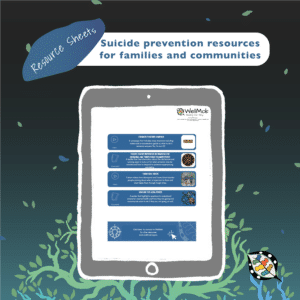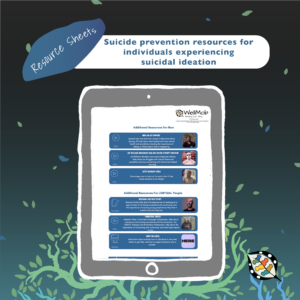Written by Angela Sheridan
Aboriginal and Torres Strait Islanders are more than twice as likely to die by suicide than non-Indigenous Australians. The statistic for our young people is even more alarming. Before colonisation, First Nations people in this country lived without the trauma of suicide. This is due to complex and interrelated historical, political, economic, social and intergenerational factors that continue to place undue stress, grief and trauma in most of our communities.
We also know that connection to family, community and culture can play a crucial part in supporting our Aboriginal and Torres Strait Islander people who are experiencing suicidality. Evidence suggests yarning about suicide can help people feel heard and not feel so alone, and that doing activities with family and friends helps individuals feel connected.

WellMob have developed Resource Sheets for Workers on a range of common wellbeing topics. These resources sheets are short cuts to the top pick of online resources on the WellMob website for that specific topic.
Given World Suicide Prevention Day and the recent R U Ok Day, we would like to showcase our resource sheets on Suicide Prevention. These online resources can support individuals experiencing thoughts of suicide as well as families and community members who want to understand how they can support people through tough times.
Whilst the links to online resources on these sheets are not an alternative to counselling/ other support for people at risk, they can play an import role both in and out of session with a First Nations person.
Here is an example of some of the resource that you will find on the Suicide Prevention Resource Sheets: pdf documents, a website and videos.
For more resources and Resource Sheets for other topics relevant to many Aboriginal and Torres Strait Island peoples, go to Resource Sheets for Workers















